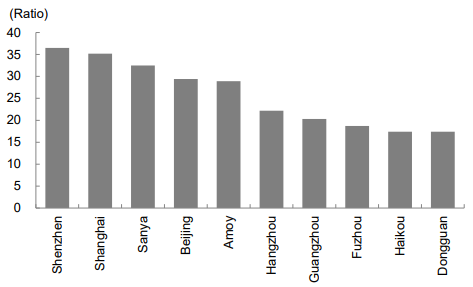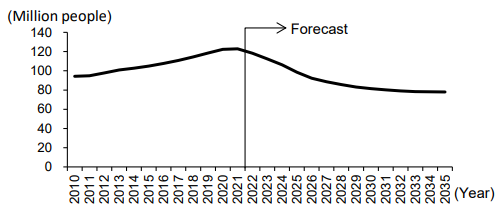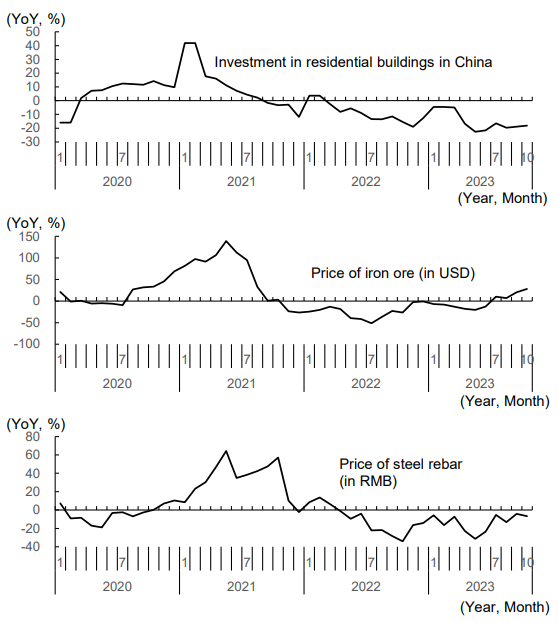I. Introduction
In China, the housing bubble has burst, triggered by the debt problems of real estate developers, and the housing market is stagnant. The restructuring of real estate developers' debt and the decline in housing prices have forced banks, as well as businesses and households, to adjust their balance sheets.
The government has provided support for debt restructuring and financing for real estate developers and eased mortgage loan terms. However, the housing market slump is likely to be prolonged due to the withdrawal of speculative funds from the housing market and the decline in the population of the age group with the largest number of primary homebuyers. Since real estate development, particularly residential development, has been a key industry driving the Chinese economy, the housing market adjustment has put a drag on the economic recovery from the COVID-19 pandemic.
Japan entered a prolonged slump after 1990, following the bursting of the bubble economy. To avoid making the same mistake, China must hasten its measures, focusing on the disposal of bad loans in the banking sector and the restructuring of the debt linked to real estate developers.
II. The Ongoing Debt Crisis of Real Estate Developers
In China, for a long time, real estate developers had ridden the wave of economic growth and urbanization, relying on debt to build homes and reap high profits. At the same time, speculation in housing had also flourished, boosting housing prices to bubble territory.
In response, in order to prevent financial risks associated with the bursting of the bubble, the government tightened regulations on real estate developers starting in 2020, setting "three red lines" (the "three-way red line" in Chinese): 1) the ratio of total debt to total assets (excluding advance proceeds from projects sold on contract) must not exceed 70%; 2) the ratio of debt to equity must not exceed 100%; and 3) the ratio of short-term debt to cash holdings must not exceed 100%. Companies that simultaneously cross the "three red lines" must not increase their interest-bearing debt.
These policies have resulted in a decrease in the cash flow of real estate developers. Evergrande Group, a major player in the industry, began to face the risk of bankruptcy in September 2021 when it defaulted on interest payments on its dollar-denominated bonds. Evergrande Group's debt crisis has subsequently spread to other real estate developers, which have come to face difficulty issuing new bonds or refinancing loans because of their declining creditworthiness. As of October 2023, of the top ten real estate developers in China in terms of annual sales (as of 2020), in addition to Evergrande Group (No. 2), Country Garden (No. 1), Sunac (No. 4), Greenland (No. 7), and Shimao (No. 8) have either defaulted on their loans or rescheduled debt payments.
Of these, the liabilities of Evergrande Group and Country Garden are particularly large (Table 1). At the end of 2022, Evergrande Group's liabilities amounted to RMB 2.437.4 trillion (approximately $350 billion). Broken down by creditors, accounts payable to business partners made up the largest share (41.1%), exceeding advance payment received for pre-sold properties (29.6%) and loans from banks and other sources (25.1%). At the same time, Country Garden's liabilities amounted to RMB 1.435 trillion (approximately $200 billion). Of these, advance payment received for pre-sold properties accounted for the largest share (46.6%), exceeding both accounts payable to business partners (30.5%) and loans from banks and other sources (18.9%).

Initially, stakeholders hoped that the debt problems of real estate developers would be resolved once the housing market picked up after a brief adjustment period, but this scenario has failed to materialize. Many real estate developers have become effectively insolvent and have been forced to restructure their debt through negotiations with their creditors. Some of them (mainly private companies) will go bankrupt or be acquired by other companies (mainly state-owned companies) (Note 1).
III. Inevitable Balance Sheet Adjustments
Large-scale debt restructuring of real estate developers, along with falling housing prices, have also led to declines in net assets in other sectors and, in turn, balance sheet adjustments.
First, banks have had to reduce their overall loans in order to maintain sound management, as some of their real estate-related loans have turned into non-performing loans.
In addition, some business partners of real estate developers, many of which are small and medium-sized enterprises, are forced to go bankrupt because they are unable to collect some of their receivables, such as building materials and construction fees.
Furthermore, the decline in housing prices has reduced the net worth of homeowners, with a negative impact on household consumption. In particular, buyers of unfinished pre-sold homes face concerns about how long they will have to wait for these homes to be delivered.
Finally, the fiscal situation of local governments is rapidly deteriorating due to a sharp decline in revenue from the transfer of state-owned land use rights (-23.3% in 2022 and -19.8% year-on-year in January-September 2023), in addition to the sluggish economy. In addition, as land prices decline, many financial vehicles established by local governments (LGFVs) that receive huge loans from banks and other financial institutions using land as collateral have found it more difficult to raise funds, and their default risk is rising. The IMF estimates that the debt owed by these financial vehicles in 2022 amounted to 57 trillion yuan (equivalent to 43% of broadly defined government debt and 48% of GDP) (Table 2) (Note 2).
(Estimation and Forecast by IMF)

IV. Real Estate Market Measures by the Government
The government has put in place a number of measures to resolve the debt problems of real estate developers and to restore the real estate market.
First, comprehensive financial support measures for the real estate market were announced on November 11, 2022, effectively eliminating the "three red lines.” Its main contents are as follows (Note 3).
- Assistance for real estate developers in raising capital and encouragement for banks to extend loans by one year for development financing that will become due within six months of the date of publication of the notice (later extended to the end of 2024). Banks are not required to change their loan classification to "non-performing" even if they agree to an extension.
- Encouragement for the provision of special loans by policy banks, such as the China Development Bank, and related loans from financial institutions to guarantee the delivery of pre-sold units (Note 4).
- Assistance for real estate developers that have run into short-term cash shortages due to poor sales or other reasons to issue bonds.
- A focus on projects in which blue-chip real estate developers merge with and acquire distressed real estate developers.
- Assistance for homebuyers and requirements for local governments to lower mortgage interest rates and down payment ratios.
A series of mortgage-related regulatory measures has also been relaxed since the summer of 2023.
First, on August 25, the Ministry of Housing and Urban-Rural Construction, the People's Bank of China, and the State Administration of Financial Supervision jointly approved the repeal of the rule requiring "no mortgage history" when local governments determine eligibility for first-time buyer status. This allowed applicable parties to qualify for lower down payment ratios and more favorable loan rates when they buy new homes to replace old homes.
In addition, on August 31, the People's Bank of China and the State Administration of Financial Supervision jointly issued a notice containing the following information (Note 5).
- The minimum down payment ratio requirements will be reduced for residential and second homes in cities with home purchase restrictions from 30 percent and 40%, respectively, to 20%and 30%—the same as in cities without home purchase restrictions.
- The minimum mortgage rate on second homes will be reduced by 0.4 percentage points (a reduction in the add-on to the 5-year loan prime rate from 0.6 percentage points to 0.2 percentage points).
- Beginning September 25, 2023, existing mortgage rates for residential housing will be reduced and refinancing will be available.
Furthermore, to stimulate investment demand for housing by households, the cap on the number of homes that can be purchased per household introduced for major cities since 2010 has been partly relaxed since 2022.
V. Prolonged Housing Market Adjustment
Despite a series of government measures, the housing market remains sluggish (Table 3). According to the National Bureau of Statistics of China, investment in residential buildings fell by 9.5% in 2022, followed by another 8.4% year-on-year in the first nine months of 2023, and floor space of residential buildings sold also fell by 26.8% in 2022, followed by 6.3% year-on-year in the first nine months of 2023. Although official statistics show that housing prices (average of 70 major cities) have fallen only 3.0% as of September 2023 compared to the peak level in August 2021, due in part to price reduction restrictions in some areas, private surveys and other sources indicate that the actual decline is much larger (Note 6).

Source: Compiled by the author based on China Statistical Summary 2023 and the National Bureau of Statistics website of China.
Although there is some optimism that the housing market will emerge from its slump as soon as the economy recovers, the housing market adjustment is likely to be rather lengthy for the following reasons.
First, housing prices are still high as a percentage of income. The ratio of housing prices to household disposable income in 2022 is higher in Shenzhen (36.5 times), Shanghai (35.2 times), Beijing (29.4 times), and other major cities than it was in Tokyo (less than 20 times) during the bubble period in the late 1980s (Figure 1). Housing prices have begun to fall, but they are still well above reasonable levels.

In addition, inventory has continued to grow, with floor space of residential building for sale rising 19.7% year-on-year in September 2023 (Note 7). It will take time for the market to digest the excess inventory.
Furthermore, with the housing market in a slump, speculative demand (purchasing a second or subsequent home in anticipation of rising prices) is waning. Potential buyers of primary residences will also delay purchases, waiting for further declines in housing prices.
The population aged 30-34, where primary homebuyers are concentrated, is on the decline, so real demand for housing is expected to remain weak (Figure 2).

Source: Compiled by the author based on the United Nations, Department of Economic and Social Affairs, Population Division, World Population Prospects 2022
On the other hand, there is a potential demand for housing as migrant workers from rural areas settle in urban areas, but their income level makes it difficult for them to purchase housing at market prices. Large-scale construction of low-rent public housing would be needed to meet their demand.
VI. Concerns over Macroeconomic Spillover
Since real estate development, and particularly residential development, has been a key industry driving the Chinese economy, the housing market adjustment has slowed the economic recovery from the COVID-19 pandemic.
First, balance sheet adjustments in major sectors have restrained the expansion of investment and consumption through a reluctance by banks to provide loans and reluctance by firms and households to borrow.
Furthermore, the 8.4% year-on-year decline in investment in residential buildings, whose total value amounts to approximately 10% of GDP, in the first 9 months of 2023, should have pulled down the GDP growth rate during that period by 0.84% (8.4% x 10%). Since China accounts for about half of the world's steel consumption, and half of that is due to demand from the construction industry centered on residential construction, fluctuations in investment in residential buildings in China also have a significant impact on international market prices for iron ore and steel (Figure 3).

Source: Compiled by the author based on Bloomberg, National Bureau of Statistics of China, and Shanghai Futures Exchange.
Furthermore, local government revenue from land transfer, which account for about one-quarter of the nation's total fiscal revenues (the sum of public finance revenues and governmental fund revenues), have fallen sharply against the backdrop of a housing market adjustment, which has also restrained public investment, particularly in infrastructure.
From 1990 onwards, the Japanese economy entered a long-term slump that came to be known as the "lost 30 years" following the bursting of the bubble economy. To avoid making the same mistake, China needs to promptly implement measures to address this urgent situation, with a strong focus on managing the disposal of bad loans in the banking sector and restructuring debt owed by real estate developers. Fortunately, all major banks in China are state-owned, and the government can be expected to bail them out in the event of an emergency, so a financial crisis due to bank failures will be avoided.
The original text in Japanese was posted on November 2, 2023.


